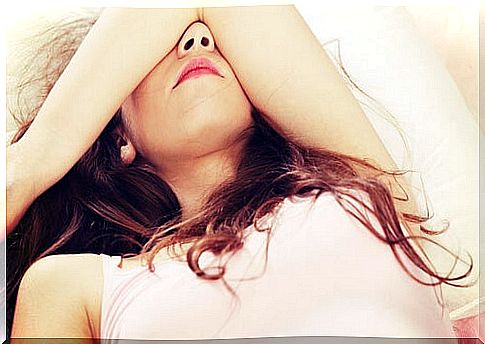7 Guidelines For Coping With Insomnia Caused By Anxiety
Insomnia is the most frequent sleep disorder among the population and, especially, in women. As this research by Mayo Clinic experts shows, it is a common sleep disorder that can cause difficulty falling asleep (falling asleep) or staying asleep, or it can cause you to wake up too early and be unable to fall asleep again.
In the same vein, this research also expresses that it is possible that the person who suffers from insomnia, continues to feel tired when they wake up. Not only can this terrible condition sap your energy and mood, it can also affect your health, job performance, and quality of life.
The causes that originate it can be many, but according to doctors and psychologists explain, behind this inability to conciliate a deep and restorative sleep, anxiety and stress hides many times.
Now, at this point, we mention fibromyalgia, which according to the same experts mentioned above, define as a disorder characterized by generalized musculoskeletal pain accompanied by fatigue and problems with sleep, memory and mood.
So, we can never neglect that diseases of this type, even hormonal alterations related to menopause, can also be a direct cause of insomnia. However, in the case of temporary insomnia, the cause is almost always due to distressing thoughts, specific worries and emotional states that we do not manage properly. These alter our brain chemistry and prevent us from falling asleep.
Today, in our space, we want to offer you 7 guidelines to deal with insomnia caused by anxiety. Do we take note?
1. Focus your thoughts correctly

Most patients who are diagnosed with insomnia tend to establish negative attributions towards sleep, so that, over time, this negative situation becomes a vicious circle that seems to have no solution:
“I can’t sleep at night because I have insomnia. Spending between 6 and 8 hours without being able to sleep makes me nervous and when it comes time to go to bed my anxiety becomes even more acute because I know I am going to have a hard time “
- Learn to focus your thoughts on the positive side in a different way: tonight I will rest well and wake up relaxed.
- Do not be afraid when you go to bed, it is one more part of the day in which you must find rest.
- Try not to think about it until the moment you are already in bed, at which point we “must disconnect” our brain and not think about anything. Leave your mind blank.
2. Establish a regular schedule
Our body likes that we keep a regular schedule in eating and in our rest, since in this way it can carry out basic tasks such as digestion, purification, filtering toxins, synthesis of enzymes and other metabolic processes that they take care of our general health.
Always eat at the same times; have dinner two hours before going to sleep and always go to bed at the same time slots. In this way, basic sleep hygiene begins to be established in which it is essential to respect sleep schedules.
3. Physical exercise always before dinner, but never just before going to bed

There is a basic rule with which to get a restful sleep and it is the following: 2 hours before going to bed we must maintain a state of absolute calm, where we must avoid exposing ourselves to these stimuli:
- Intense physical exercise: Before going to bed it would serve us to “activate” and not to relax, since it would reactivate our brain with a series of neurotransmitters and endorphins that are not conducive to obtaining a restorative rest. Remember that endorphins, according to Jack Lawson, author of “Endorphins – The drug of happiness” , regulate our reactions and even our personality has its origin in them, that is, in the chemistry that governs us. The good thing, Jack explains, is that we in turn can govern some of these chemical processes by learning to use them according to our needs.
Ideally, go for a half hour walk before dinner, get home, take a quick shower, and have dinner. Then you just have to relax.
- Exciting visual stimuli: We must avoid them at all costs, such as the light projected by computer or mobile screens, better known as blue light. The reason is that these are clear insomnia enhancers that we should avoid at least 2 hours before going to sleep. The best thing to do with the mobile is to put it to play a track that helps us fall asleep, such as a guided meditation or also white noises, such as sounds of rain, winds and bird songs, to mention just 2 examples .
4. Establish small moments throughout the day to vent anxiety
When we are tired, we sit down; when we are hot, we cool off; and when we are thirsty, we drink. Why then do we not look for small moments to vent our anxiety? It is a vital necessity as important as relieving tiredness or thirst.
However, you must first discover how it works best for you to “vent that inner pressure.” There are those who will do well talking to a friend, others do well to write or read, go for a walk, knit by hand, go to the gym or paint.
The important thing is that throughout the day you look for spaces and moments for yourself where you feel good, where you can be yourself and relax, as well as to relieve anxiety.
5. Yes to naps, but very brief
You may think that sleeping at noon will take away hours of rest at night. However, this is not the case. Take note of these aspects:
- Sleeping naps between 15 and 25 minutes at noon, offers a mental rest to our brain, perfect to arrive more “liberated” at night.
- It is a physiological relief that is complemented in turn by your moments of liberation that we have suggested in the previous point. If you make it routine, whenever possible, your body will get used to it and you will be able to cope with insomnia.
6. Establish a balance between your obligations and your needs
Quickly answer this question: What do you need to be happy?
- More time for you?
- Spend more time with your partner and your children?
- See less of that person who hurts you?
- Have a simpler life?
- Do something different that excites you?
If you know what you need to be happier and put aside that daily anxiety that causes you insomnia, do something every day that will bring you closer to those goals. You may think that it is impossible, but in life sometimes it is necessary to make big changes to find our true well-being. Give yourself more priority in the day to day.
7. Basic guidelines to combat insomnia produced by anxiety
- Your bedroom should be quiet, dark, and cool.
- Practice simple breathing exercises before going to sleep.
- Two hours before going to bed, it is necessary that you leave your mind blank, that you do not focus your thoughts on what you are going to do the next day. Avoid, above all, thinking that “you are not going to sleep.”
- Also help yourself with the always beneficial medicinal plants to combat anxiety such as, for example, passionflower, St. John’s wort, valerian or even evening primrose oil.
Finally, remember that it is extremely important to deal with this situation with all the necessary support, including professional support. These tips that we have just offered you are not a substitute for any medication that may be prescribed by a professional, with a prior analysis before doing so.
It is also very important to highlight the fact that we should not only avoid insomnia by applying these tips, but we should also add improving our lifestyle habits in general, starting with diets, which must be healthy, balanced and responsible.
Valeria Sabater
Graduated in Psychology from the University of Valencia in 2004. Master in Safety and Health at work in 2005 and Master in Mental System Management: neurocreativity, innovation and sixth sense in 2016 (University of Valencia). Collegiate number CV14913. He took the course Nutrition and obesity: overweight control, offered by the National Autonomous University of Mexico (UNAM). Student of Social and Cultural Anthropology at UNED, Valeria Sabater has worked in the area of social psychology selecting and training personnel. Since 2008, she has been a psychology and emotional intelligence trainer in secondary schools and offers psycho-pedagogical support to children with development and learning problems. In addition, she is a writer and has received various literary awards.









